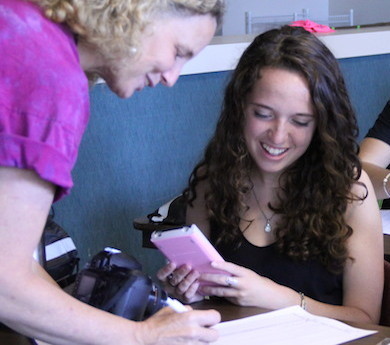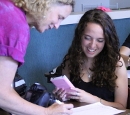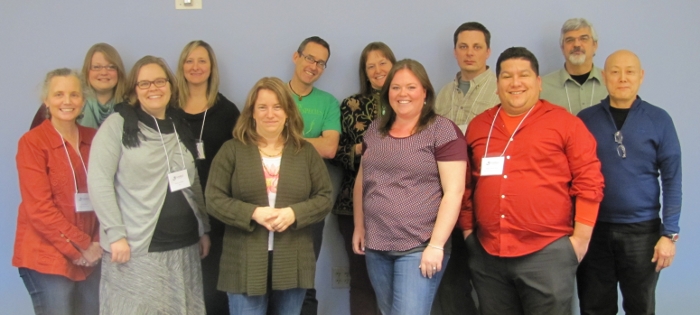| Description | Participants | Summary | Products |
|---|

Archived NIMBioS Working Group
Expanding Data Nuggets
Topic: Expanding Data Nuggets: Development and assessment of an integrative resource to increase quantitative literacy
Meeting dates: January 7-9, 2015
Organizers:
Melissa Kjelvik, Zoology & EEBB, Michigan State Univ.
Elizabeth Schultheis, Plant Biology & EEBB, Michigan State Univ.
Julie Morris, Biological Sciences, Univ. of Denver
Objectives: Data Nuggets (http://datanuggets.org) are worksheets designed to give students practice interpreting quantitative information and making claims based on evidence. The standard format of each Nugget provides a brief background to a researcher and their study system, along with a small, manageable dataset. Students are challenged to answer a scientific question using the dataset to support their claim, and are guided through the construction of graphs to facilitate data interpretation. Graphing and content levels allow for differentiated learning for students with any science, math, or reading background. Data Nuggets can be structured around any research area. Current Nuggets address evolution, ecology, behavioral biology, and biogeochemistry. Because of their simplicity and flexibility, Data Nuggets can be used across grades and throughout the school year as students build their quantitative skills. Major steps are still needed before Data Nuggets' wide dissemination and adoption in classrooms, but the ubiquitous excitement from science educators foretells the success of the Nuggets. This Working Group will serve as a mechanism to bring NIMBioS resources and leaders in science education research and reform together in an effort to develop a national resource focused on integrating mathematics and science, particularly in the fields of ecology and evolutionary biology. The Group has three objectives:
- Identify skills necessary for progression towards quantitative literacy and discuss the role of Data Nuggets in acquiring these skills
- Assess the efficacy of Data Nuggets as an educational tool
- Build a library of resources for use alongside Data Nuggets in undergraduate classrooms

Meeting Summary
| Mtg # | Dates | Agenda | Summary | Photo | Evaluation |
|---|---|---|---|---|---|
| 1 | Jan 7-9, 2015 | Link | Link | Report |
Meeting 1 Summary. The Data Nuggets working group brought together a diverse team of leaders in curriculum reform (K-12 and undergraduate) and education resource assessment, education researchers, mathematicians, biologists, and a high school teacher. The group discussed common difficulties experienced by students when performing tasks that merge science content with quantitative skills and how Data Nuggets can alleviate these difficulties. Based on these discussions, our next steps are to identify specific quantitative skills we want students to develop by using Data Nuggets. These learning outcomes will inform the development of a preliminary assessment tool that we will use to examine student gains after using Data Nuggets. Additionally, we hope to extend Data Nuggets to the undergraduate classroom and will be piloting Data Nuggets in introductory biology and math courses. We will organize professional development sessions for faculty to learn about and create Data Nuggets.
 |
| Meeting 1 participants (L to R): Louise Mead, Melissa Kjelvik, Molly Stuhlsatz, Laurel Hartley, Julie Morris, Paul Strode, Kristin Jenkins, Elizabeth Schultheis, Jeremy Wojdak, Ariel Cintron-Arias, Robert Mayes, Gordon Uno. Not Pictured: Dai-Trang Le, Jennifer Schuttlefield Christus. |
NIMBioS Working Groups are chosen to focus on major scientific questions at the interface between biology and mathematics. NIMBioS is particularly interested in questions that integrate diverse fields, require synthesis at multiple scales, and/or make use of or require development of new mathematical/computational approaches. NIMBioS Working Groups are relatively small (up to 10 participants), focus on a well-defined topic, and have well-defined goals and metrics of success. Working Groups will meet up to 3 times over a two-year period, with each meeting lasting up to 2.5 days.
A goal of NIMBioS is to enhance the cadre of researchers capable of interdisciplinary efforts across mathematics and biology. As part of this goal, NIMBioS is committed to promoting diversity in all its activities. Diversity is considered in all its aspects, social and scientific, including gender, ethnicity, scientific field, career stage, geography and type of home institution. Questions regarding diversity issues should be directed to diversity@nimbios.org. You can read more about our Diversity Plan on our NIMBioS Policies web page. The NIMBioS building is fully handicapped accessible.
NIMBioS
1122 Volunteer Blvd., Suite 106
University of Tennessee
Knoxville,
TN 37996-3410
PH: (865) 974-9334
FAX: (865) 974-9461
Contact NIMBioS



